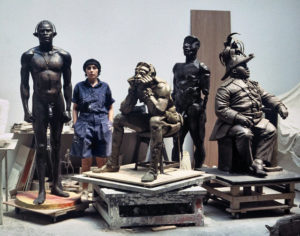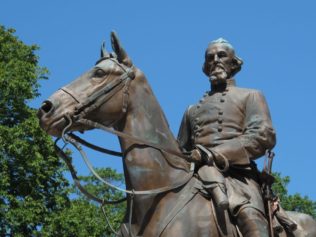
Sculptor Gabriel Koren has been studying Black history since she immigrated to the U.S. (Photo by Gabriel Koren)
Goodbye, Robert E. Lee; Hello W.E.B.: Hungarian Sculptor Wants to Honor Black Heroes Now That Confederate Statues Are Coming Down
For This Sculptor, Statues Honoring African-American Heroes Are the Perfect Substitute for Confederate Monuments
Artist Thinks Statues Celebrating Black Heroes Should Take Place of Downed Confederate Monuments
**As Confederate Monuments Come Down All Over the Nation, Sculptor Wants to Replace Them with Ones of Black Heroes
**NYC Artist Wants to Replace Confederate Memorials with Sculptures of African-American Icons Like Baldwin, Garvey
As Confederate monuments continue coming down across the nation, one of America’s most noted sculptors has a list of worthy candidates she’d like to replace them with.
Hungarian-born artist Gabriel Koren is hoping to replace the likes of Confederate Generals Robert E. Lee and Stonewall Jackson with African-American heroes like W.E.B. Du Bois and James Baldwin. A fan of peering into the past, Koren has been studying Black history since she immigrated to New York City nearly 40 years ago, The Daily Beast reported.
With her statues honoring abolitionist Frederick Douglass and activist Malcolm X on public display in Upper Manhattan, the 69-year-old artist said she hopes to see more monuments honoring Black heroes erected across the nation. The recent violence in Charlottesville, Va., that left one woman dead and 19 others severely injured have since accelerated efforts to remove controversial statues honoring Confederate figures.
The violent rally, led by white nationalists, Neo-Nazis and KKK members earlier this month, was organized in response to efforts to remove statues of Lee and Jackson.
“I’m very happy they are coming down,” Koren told The Daily Beast of the Confederate figures. “And I’m going to make sculptures that are going up!
“My life is not long enough to do all of them.”
In a recent interview with the news site, Koren recalled the time her father, who traveled as a musician, returned with an issue of National Geographic that featured countless photos of African people.
“Just the most gorgeous people you can imagine,” she recounted.
Seeing more pictures of African people in newsreels that reported on colonies that gained their independence during the 1960s, the young artist said she expected people of African descent to be among the folks she’d meet once she earned her master’s degree from the Hungarian Academy of Fine Arts and moved to New York.
“I thought if I came to New York City, so many different people, so many different cultures, I thought I’m going to have lot of friends in these different groups,” she told the publication.
Koren began attending lectures on Black history after her African-American boyfriend introduced her to WLIB radio and attended a meeting organized by activist Rev. Herbert Daughtry. Although she was often the only white person there, she remained undeterred and continued attending lectures all over the city.
“I caught fire,” she recalled. “I said ‘What a story! What an incredible story!’ ”
Koren began telling that story through her artwork. She started with two Black versions of the classic Apollo of Ancient Greece; one version with images of Black history emblazoned on his skin and the other appearing shattered by the forces of that history, then put back together, according to the news site.
She later entered and won a competition for a commission to sculpt a statue of Frederick Douglass. The project took her eight years to complete.
Koren has turned into a literal “starving artist” in recent years, however, as she’s fallen on hard times and recently lost her studio in New York. The Daily Beast reported that she earned just $1,600 in 2015 and $1,821 in 2016. Her pieces, including the Black Apollos and a statue honoring activist Marcus Garvey, are now in storage.
“I’m not going to stop doing sculptures because nobody buys it,” she told the news site. “James Baldwin, I want to do James Baldwin. … W.E.B Dubois, he’s very important. He was the most important historian. He just has to be done.”


